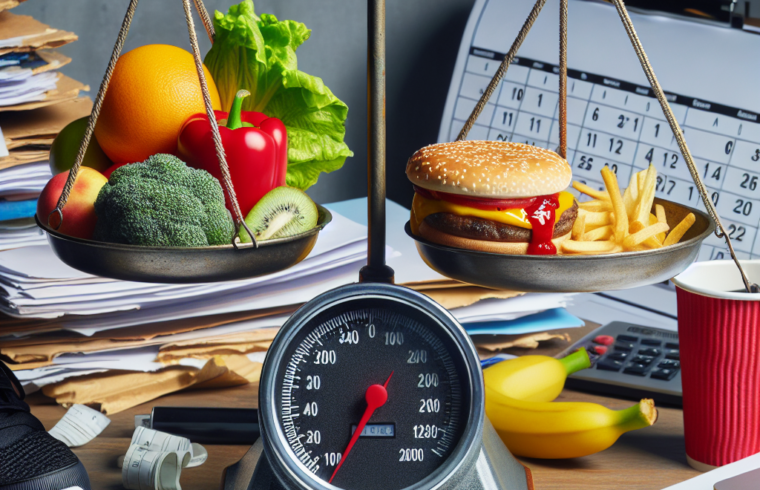Understanding the Stress-Weight Connection
What Happens in Our Bodies?
Stress is something we all know too well, right? Life throws curveballs, and how we respond can really affect our bodies. When we’re stressed, our bodies produce a hormone called cortisol. It’s basically a signal to our body that it’s time to react and often leads to cravings for high-sugar, high-fat comfort foods. Seriously, who hasn’t reached for a donut on a rough day?
But it’s not just about cravings. Cortisol can also hang around in our system, making it more challenging to shed weight. This excess energy stored as fat is our body’s way of preparing for a ‘fight or flight’ scenario, but in today’s world, that usually just translates to more muffin tops.
Need a Strong Nutrition Boost for Your Diet? Take a Look...
From my experience, understanding this connection was a real eye-opener. Knowing why I crave certain foods when I’m stressed helped me take a step back and reassess my choices. It’s like once you know what the deal is, you feel empowered to make different decisions!
Emotional Eating and Stress
The Comfort Food Trap
Let’s talk about emotional eating for a sec. This is something I think a lot of us can relate to. You have a stressful week at work, and all you want to do is dive into a pint of ice cream or a big bag of chips, right? It’s almost like this comforting ritual, but it totally sabotages our weight loss journey.
I’ve often found myself eating when I’m stressed, not even because I’m hungry, but because it feels good in the moment. It’s like a temporary escape. The tricky part is that this habit can lead to guilt and shame afterward, which adds to the stress cycle. Ugh, it’s a frustrating loop!
Breaking this cycle takes some practice and awareness. Learning to recognize when I’m eating emotionally versus physically hungry was a game changer for me. Instead of reaching for food, sometimes I’ll go for a walk or journal my feelings instead. It’s all about replacing those habits with healthier coping mechanisms!
Need a Strong Nutrition Boost for Your Diet? Take a Look...
Managing Stress for Weight Loss
Effective Stress-Relief Strategies
Here’s the good part—there are plenty of ways to manage stress that can help you on your weight loss journey. For me, exercise has been a huge outlet. It doesn’t just help burn calories; it releases endorphins, which naturally improve your mood. When I lace up my shoes for a run or hit the gym, it can completely turn my day around.
Another stress-buster I swear by is mindfulness and meditation. Taking just a few minutes to sit quietly and breathe can be incredibly grounding. I like to use apps that help guide you through the process, making it feel less daunting. Honestly, it’s amazing how this simple practice can clear your mind and reduce those pesky stress levels.
Finding support from friends and family also plays a key role in managing stress. Whether it’s venting about a bad day or just sharing laughs, social connections can really lift our spirits. I’ve leaned into my support system, and it’s helped not just with my mood but also with my overall health goals.
The Role of Sleep in Weight Management
Sleep’s Surprising Influence
Okay, let’s get real about sleep. We all know it’s crucial, but did you know that stress impacts our sleep quality? When I’m stressed, my brain races, making it tough to drift off. And here’s the kicker—less sleep can lead to increased cravings and a preference for junk food, which is a no-win situation!
Good HealthY DIETING Solution is Easier Than Most People Think!
Take a Look for Yourself!
Research shows that lack of sleep can throw off hormones related to hunger, specifically ghrelin and leptin. Ghrelin makes you hungry, while leptin signals fullness. When you’re sleep-deprived, ghrelin levels go up, and leptin levels drop. Boom—this is why you may be reaching for snacks more often when you’re tired!
I learned that prioritizing good sleep hygiene can make a massive difference. Simple practices, like setting a consistent bedtime or creating a relaxing bedtime routine, have helped me sleep better. Trust me, getting more quality sleep was one not-so-small adjustment that helped balance my cravings and enabled me to stick to my weight loss plan.
Long-term Lifestyle Changes
Building Resilience Against Stress
So, while you might feel like a stress monster sometimes, the journey doesn’t end here. It’s all about creating long-term lifestyle changes that help you manage stress better and, in turn, support your weight loss goals. This has been a fundamental lesson for me—small, sustainable changes are far better than any fad diet!
Visualization techniques can help build mental resilience. For example, I often imagine my stress as a bubble—when I breathe slowly, it’s like popping that bubble, allowing the stress to float away. Techniques like these help create a positive mental space, making it easier to make conscious, healthy choices.
Furthermore, developing a healthy routine including balanced meals, regular activity, and self-care practices can help keep stress at bay. It’s become a way of life for me—one that feels much more rewarding than any quick fix ever could.
FAQs
What are the main effects of stress on weight loss?
Stress can lead to hormonal imbalances that affect appetite and cravings, often resulting in weight gain rather than loss. It can also trigger emotional eating and unhealthy food choices.
How can I manage stress to support my weight loss goals?
Incorporating regular exercise, practicing mindfulness or meditation, establishing a solid support system, and ensuring good sleep are all effective strategies to manage stress.
Why is sleep important for weight loss?
A lack of sleep disrupts hormones that regulate hunger, leading to increased appetite and cravings. Prioritizing quality sleep helps maintain a balanced metabolism and reduces the likelihood of emotional eating.
Are there specific foods that can help reduce stress?
Foods rich in omega-3 fatty acids, antioxidants, and vitamins can help combat stress. Leafy greens, nuts, fatty fish, and berries are great options to incorporate into your diet.
How can I replace emotional eating with healthier habits?
Identifying triggers for emotional eating is crucial. Engaging in alternative activities such as exercise, journaling, or talking to a friend can help redirect those feelings in a healthier way.












